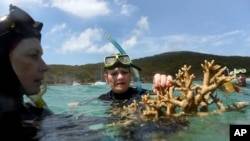andrewmac0
Rookie
- Dec 4, 2012
- 2
- 0
- 1
To die for scenic reefs in Red or the South China Sea is dying; pretty fishes and panoramic colors of soft and hard corals are now down to a complex ecology similar to tropical forest ecosystems. Compare to the microorganisms that makes the whole thing more tremendous in doing all the destruction, the predators and consumers, the producer algae and the tiny invertebrates mean nothing.
Catalina Reyes of CoECRS. (Centre of Excellence for Coral Reef Studies) and the University of Queensland has published her work alongside 4 colleagues, on the bacteria, fungi and algae that live in this most complex marine ecosystem.
The change in this ecosystem recently is because of our overproduction. Oceans now are Cola like, the CO2 we made over the last century or two has made the sea water to feel like one. As to Catalinas research, the acid has effects and that are clearly identifies in the micro-world of corals. She links it all up and explained, So fish, turtles, sharks, lobsters and other reef organisms may lose their homes, threatening coral reef biodiversity and the livelihoods of tens of millions of people. All reefs, molluscs and others are basically made up of Calcium carbonate, accepted as true to hard corals as well. Due to different reasons erosion of the reef is just a normal phenomenon but at present the erosion has become excessive that it destroys the reefs worldwide at a really disturbing rate.
The well equilibrium of attrition, storm damage, predation and growth has been distorted. Today, deterioration seems to be the pattern in lieu of slow growth. And because of the acid now less and less carbonate is available. You have probably had experimented such in your school laboratory. Micro-boring organisms also eliminate the coral skeleton as usual consequently oceans ends up with no reef!
Catalina found a 35% rate of erosion in the second example when computer simulation by the researchers compared current increases in carbon dioxide levels and their effects on reefs with those lesser increases which we hope to achieve by cutting emissions.
The dreadful effect of doing nothing about emissions was a doubling 100% of the erosion. Because of acidic conditions, Micro-boring organisms became much more active and seemed to have a higher temperatures and pH (acidity) that causing the destructions of more corals. A great number and the most common of all was a tiny alga that has the ability in photosynthesizing even in the low light conditions as it penetrated deep into the corals hearts.
Catalina Reyes of CoECRS. (Centre of Excellence for Coral Reef Studies) and the University of Queensland has published her work alongside 4 colleagues, on the bacteria, fungi and algae that live in this most complex marine ecosystem.
The change in this ecosystem recently is because of our overproduction. Oceans now are Cola like, the CO2 we made over the last century or two has made the sea water to feel like one. As to Catalinas research, the acid has effects and that are clearly identifies in the micro-world of corals. She links it all up and explained, So fish, turtles, sharks, lobsters and other reef organisms may lose their homes, threatening coral reef biodiversity and the livelihoods of tens of millions of people. All reefs, molluscs and others are basically made up of Calcium carbonate, accepted as true to hard corals as well. Due to different reasons erosion of the reef is just a normal phenomenon but at present the erosion has become excessive that it destroys the reefs worldwide at a really disturbing rate.
The well equilibrium of attrition, storm damage, predation and growth has been distorted. Today, deterioration seems to be the pattern in lieu of slow growth. And because of the acid now less and less carbonate is available. You have probably had experimented such in your school laboratory. Micro-boring organisms also eliminate the coral skeleton as usual consequently oceans ends up with no reef!
Catalina found a 35% rate of erosion in the second example when computer simulation by the researchers compared current increases in carbon dioxide levels and their effects on reefs with those lesser increases which we hope to achieve by cutting emissions.
The dreadful effect of doing nothing about emissions was a doubling 100% of the erosion. Because of acidic conditions, Micro-boring organisms became much more active and seemed to have a higher temperatures and pH (acidity) that causing the destructions of more corals. A great number and the most common of all was a tiny alga that has the ability in photosynthesizing even in the low light conditions as it penetrated deep into the corals hearts.


